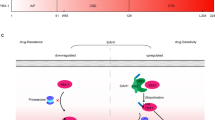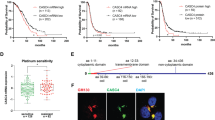Abstract
Epithelial ovarian cancer (EOC) invasion and metastasis are complex phenomena that result from the coordinated action of many metastatic regulators and must be overcome to improve clinical outcomes for patients with these cancers. The identification of novel therapeutic targets is critical because of the limited success of current treatment regimens, particularly in advanced-stage ovarian cancers. In this study, we found that tetraspanin 8 (TSPAN8) is overexpressed in about 52% (14/27) of EOC tissues and correlates with poor survival. Using small interfering RNA-mediated TSPAN8 knockdown and a competition assay with purified TSPAN8 large extracellular loop (TSPAN8–LEL) protein, we identified TSPAN8–LEL as a key regulator of EOC cell invasion. Furthermore, monotherapy with TSPAN8-blocking antibody we developed shows that antibody-based modulation of TSPAN8–LEL can significantly reduce the incidence of EOC metastasis without severe toxicity in vivo. Finally, we demonstrated that the TSPAN8-blocking antibody promotes the internalization and concomitant downregulation of cell surface TSPAN8. Collectively, our data suggest TSPAN8 as a potential novel therapeutic target in EOCs and antibody targeting of TSPAN8 as an effective strategy for inhibiting invasion and metastasis of TSPAN8-expressing EOCs.
This is a preview of subscription content, access via your institution
Access options
Subscribe to this journal
Receive 50 print issues and online access
$259.00 per year
only $5.18 per issue
Buy this article
- Purchase on Springer Link
- Instant access to full article PDF
Prices may be subject to local taxes which are calculated during checkout






Similar content being viewed by others
References
Teo MC . Update on the management and the role of intraperitoneal chemotherapy for ovarian cancer. Curr Opin Obstet Gynecol 2014; 26: 3–8.
Novoa-Vargas A . [Natural history of ovary cancer]. Ginecol Obstet Mex 2014; 82: 613–622.
Lengyel E . Ovarian cancer development and metastasis. Am J Pathol 2010; 177: 1053–1064.
Kim A, Ueda Y, Naka T, Enomoto T . Therapeutic strategies in epithelial ovarian cancer. J Exp Clin Cancer Res 2012; 31: 14.
Ovarian cancer, five-year stage-specific relative survival rates (2004-2008). J Natl Cancer Inst 2011; 103: 1287.
Keating GM . Bevacizumab: a review of its use in advanced cancer. Drugs 2014; 74: 1891–1925.
Maecker HT, Todd SC, Levy S . The tetraspanin superfamily: molecular facilitators. FASEB J 1997; 11: 428–442.
Hemler ME . Tetraspanin proteins promote multiple cancer stages. Nat Rev Cancer 2014; 14: 49–60.
Zoller M . Tetraspanins: push and pull in suppressing and promoting metastasis. Nat Rev Cancer 2009; 9: 40–55.
Kanetaka K, Sakamoto M, Yamamoto Y, Yamasaki S, Lanza F, Kanematsu T et al. Overexpression of tetraspanin CO-029 in hepatocellular carcinoma. J Hepatol 2001; 35: 637–642.
Szala S, Kasai Y, Steplewski Z, Rodeck U, Koprowski H, Linnenbach AJ . Molecular cloning of cDNA for the human tumor-associated antigen CO-029 and identification of related transmembrane antigens. Proc Natl Acad Sci USA 1990; 87: 6833–6837.
Kanetaka K, Sakamoto M, Yamamoto Y, Takamura M, Kanematsu T, Hirohashi S . Possible involvement of tetraspanin CO-029 in hematogenous intrahepatic metastasis of liver cancer cells. J Gastroenterol Hepatol 2003; 18: 1309–1314.
Yue S, Mu W, Zoller M . Tspan8 and CD151 promote metastasis by distinct mechanisms. Eur J Cancer 2013; 49: 2934–2948.
Zhou Z, Ran YL, Hu H, Pan J, Li ZF, Chen LZ et al. TM4SF3 promotes esophageal carcinoma metastasis via upregulating ADAM12m expression. Clin Exp Metastasis 2008; 25: 537–548.
Kuhn S, Koch M, Nubel T, Ladwein M, Antolovic D, Klingbeil P et al. A complex of EpCAM, claudin-7, CD44 variant isoforms, and tetraspanins promotes colorectal cancer progression. Mol Cancer Res 2007; 5: 553–567.
Gesierich S, Paret C, Hildebrand D, Weitz J, Zgraggen K, Schmitz-Winnenthal FH et al. Colocalization of the tetraspanins, CO-029 and CD151, with integrins in human pancreatic adenocarcinoma: impact on cell motility. Clin Cancer Res 2005; 11: 2840–2852.
Thibault B, Castells M, Delord JP, Couderc B . Ovarian cancer microenvironment: implications for cancer dissemination and chemoresistance acquisition. Cancer Metastasis Rev 2014; 33: 17–39.
Lennon S, Barton C, Banken L, Gianni L, Marty M, Baselga J et al. Utility of serum HER2 extracellular domain assessment in clinical decision making: pooled analysis of four trials of trastuzumab in metastatic breast cancer. J Clin Oncol 2009; 27: 1685–1693.
Albanell J, Baselga J . The ErbB receptors as targets for breast cancer therapy. J Mammary Gland Biol Neoplasia 1999; 4: 337–351.
Payne SJ, Bowen RL, Jones JL, Wells CA . Predictive markers in breast cancer—the present. Histopathology 2008; 52: 82–90.
Okada Y, Miyamoto H, Goji T, Takayama T . Biomarkers for predicting the efficacy of anti-epidermal growth factor receptor antibody in the treatment of colorectal cancer. Digestion 2014; 89: 18–23.
Bardelli A, Siena S . Molecular mechanisms of resistance to cetuximab and panitumumab in colorectal cancer. J Clin Oncol 2010; 28: 1254–1261.
Ailane N, Greco C, Zhu Y, Sala-Valdes M, Billard M, Casal I et al. Effect of an anti-human Co-029/tspan8 mouse monoclonal antibody on tumor growth in a nude mouse model. Front Physiol 2014; 5: 364.
Huynh H, Teo CC, Soo KC . Bevacizumab and rapamycin inhibit tumor growth in peritoneal model of human ovarian cancer. Mol Cancer Ther 2007; 6: 2959–2966.
Xu Y, Li Q, Li XY, Yang QY, Xu WW, Liu GL . Short-term anti-vascular endothelial growth factor treatment elicits vasculogenic mimicry formation of tumors to accelerate metastasis. J Exp Clin Cancer Res 2012; 31: 16.
Kudo-Saito C, Yura M, Yamamoto R, Kawakami Y . Induction of immunoregulatory CD271+ cells by metastatic tumor cells that express human endogenous retrovirus H. Cancer Res 2014; 74: 1361–1370.
Ki MK, Jeoung MH, Choi JR, Rho SS, Kwon YG, Shim H et al. Human antibodies targeting the C-type lectin-like domain of the tumor endothelial cell marker clec14a regulate angiogenic properties in vitro. Oncogene 2013; 32: 5449–5457.
Lee S, Yoon IH, Yoon A, Cook-Mills JM, Park CG, Chung J . An antibody to the sixth Ig-like domain of VCAM-1 inhibits leukocyte transendothelial migration without affecting adhesion. J Immunol 2012; 189: 4592–4601.
Acknowledgements
This work was supported by a research grant (10TS03) from the Scripps Korea Antibody Institute.
Author information
Authors and Affiliations
Corresponding authors
Ethics declarations
Competing interests
The authors declare no conflict of interest.
Additional information
Supplementary Information accompanies this paper on the Oncogene website
Rights and permissions
About this article
Cite this article
Park, C., Kim, TK., Kim, H. et al. Therapeutic targeting of tetraspanin8 in epithelial ovarian cancer invasion and metastasis. Oncogene 35, 4540–4548 (2016). https://doi.org/10.1038/onc.2015.520
Received:
Revised:
Accepted:
Published:
Issue Date:
DOI: https://doi.org/10.1038/onc.2015.520
This article is cited by
-
TSPAN8 regulates EGFR/AKT pathway to enhance metastasis in gastric cancer
Molecular Biology Reports (2023)
-
Tetraspanin Tspan8 restrains interferon signaling to stabilize intestinal epithelium by directing endocytosis of interferon receptor
Cellular and Molecular Life Sciences (2023)
-
Tetraspanin8 expression predicts an increased metastatic risk and is associated with cancer-related death in human cutaneous melanoma
Molecular Cancer (2021)
-
SOX9 is a critical regulator of TSPAN8-mediated metastasis in pancreatic cancer
Oncogene (2021)
-
High-throughput single-cell activity-based screening and sequencing of antibodies using droplet microfluidics
Nature Biotechnology (2020)



